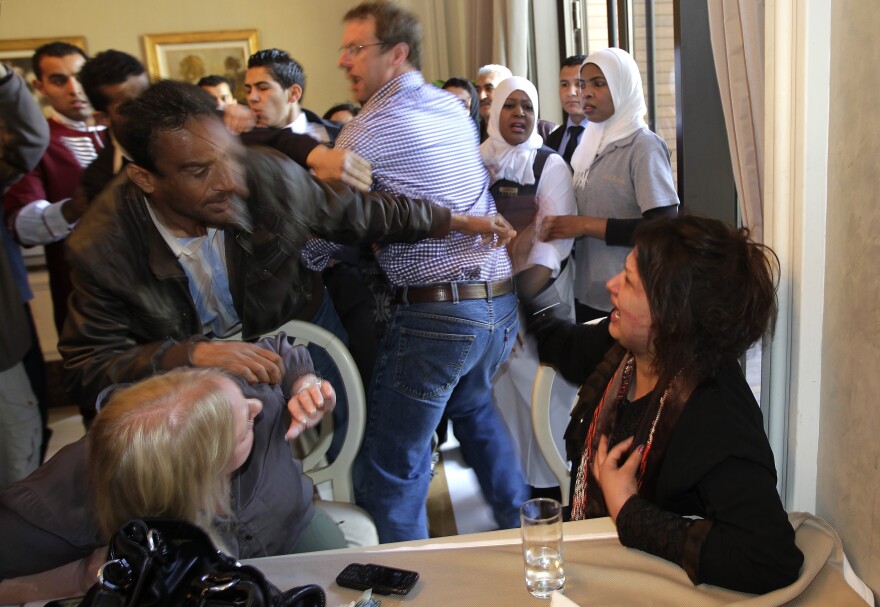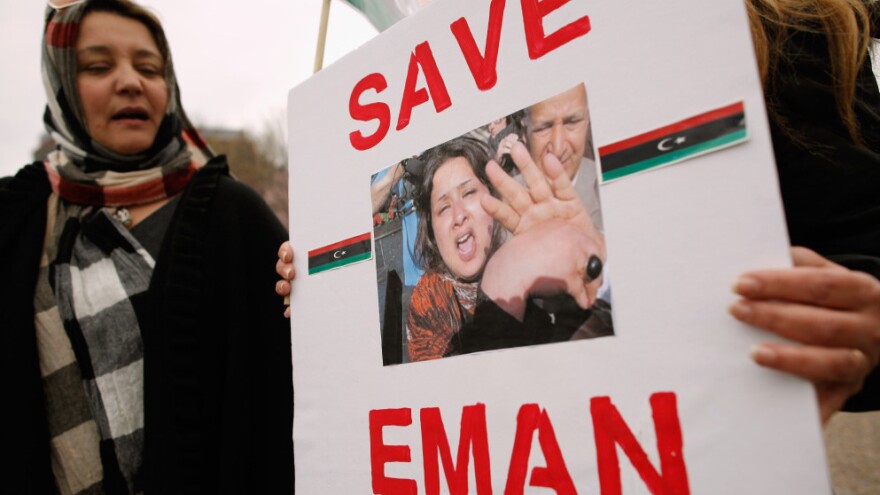More than two weeks ago, Iman al-Obeidi burst into a Tripoli hotel and told assembled journalists there that she had been gang-raped by members of forces loyal to Libyan leader Moammar Gadhafi after being stopped at a checkpoint in the capital.
NPR's Lourdes Garcia-Navarro snuck out of her guarded hotel Monday with another reporter and went to visit Obeidi at her home. They were the first reporters to independently speak with her in person. Because journalists are unable to report freely in Tripoli, NPR cannot verify her claims.
Iman al-Obeidi greets us in a pair of shorts and a striped T-shirt. She is dressed informally because we are all women, and she hasn't been going out much lately.
She tells us she hasn't ventured outside in three days and is struggling to keep her morale high. She says she has little access to the outside world, few friends come to see her, and she is afraid to go out for too long as she is now a recognized face in the capital after Libyan state television launched a smear campaign against her.
The marks on her body from her ordeal are still visible. She says this is the first time she has really spoken in detail about the horror of her rape and her dramatic escape.
Obeidi, who is 28 years old and unmarried, says she was picked up at a checkpoint because her ID card said she was from the east, where the rebellion against Gadhafi was born. She says they were trying to punish her for what was happening there. She and another woman were taken to a house, she says, where there were a lot of men.
"I was fighting them off so much that they tied my legs and arms together. They were drinking a lot, and they would spill the alcohol in my eyes," Obeidi says. "And they would kick my head with their boots."
She says the men would come in groups of three and repeatedly rape her. But according to Obeidi, the ringleader was a man she recognized — the son of a government minister. She says he was the most brutal.
"Every time he would try to rape me, I would push him away with my legs, and he would scratch my thighs from both sides to force me," she says.
She partially pulls down her shorts to show the fading marks.
"For two days this happened to me," she says. "They raped me again really early in the morning on the third day. They were totally drunk. A lot of them just passed out.

"I was in a big room with the other woman. They were raping her, too, but she wasn't fighting back so they didn't tie her up. I asked the other woman to please try to untie me. ... It took awhile to convince the other woman to help me."
Obeidi eventually freed herself and snuck out the window. She says the woman who helped her stayed behind, too frightened to try to run away.
Wrapped only in a tablecloth and bleeding, Obeidi says she tried to make her way out of the compound, but there was a huge wall and an electric gate. She grabbed a piece of metal and ran at the two African guards who were sleeping, screaming hysterically and demanding that the gate be opened.
"The guards were shocked to see a bleeding naked woman with wild hair holding a piece of metal," she says. "So they opened the gate for me and I just ran out."
And there, she was helped by people in the neighborhood.
"[The neighbors] put me in a taxi, paid the fare, and I told the taxi driver to take me to the hotel [where the journalists are staying]," she says.
She says she went there because she knew she would never get justice otherwise.
The government initially tried to call Obeidi a liar, but she was physically examined and witnesses corroborated her story.
Libyan government spokesman Moussa Ibrahim acknowledges that it seems she was raped, but he is still calling her reputation into question by variously saying she has a political agenda or is a prostitute.
"This woman, this is her line of work. She's well-known for that — she has a file. This is no secret," Ibrahim says. "She claimed that she was kidnapped and raped. This is a legal criminal case. We wondered why she made it look political. I mean, it's not like the whole Libyan army raped her, is it?"
Back in her apartment, Obeidi says the government simply wants to hide what happened. She has been to the prosecutor's office, but no one has brought the men up on charges. They haven't even searched the house where she was held for days, she says. Even her lawyers have asked her to change her story.
The only thing she wants now is to be able to go home to her family in the east. But she says the Gadhafi family is refusing to allow her to travel.
And so she sits and waits, afraid but undaunted.
"I want my freedom," she says. "I want my family."
Copyright 2023 NPR. To see more, visit https://www.npr.org.





